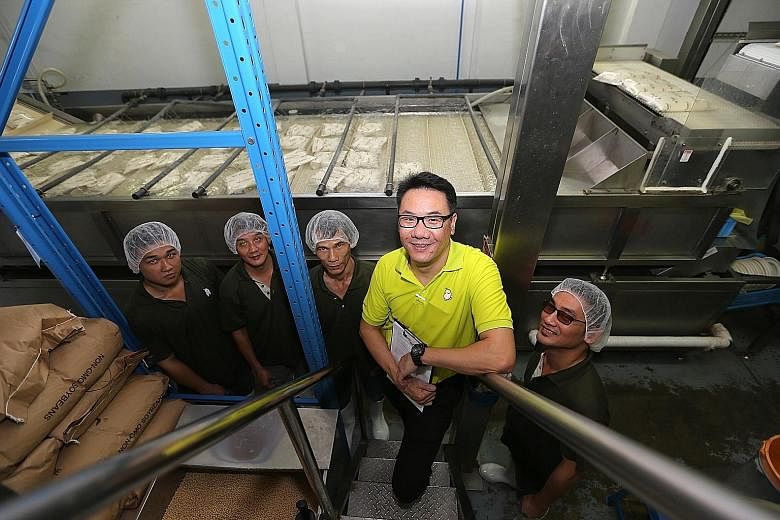It took about 60 workers to cook up soya milk for customers at Mr Bean outlets islandwide 10 years ago.
Back then, they made about 200 litres of the beverage per day at each of the company's 32 outlets.
Since then, Mr Bean has made use of automation to double its production. It now churns out some 12,000 litres of soya milk per day at a central kitchen in Paya Lebar.
It takes only six workers to man machines that soak and grind the beans, and then steam and package the milk for delivery to the 53 outlets now run by Mr Bean.
The workers are supervised by central kitchen manager Jerome Ang, 42, who was tasked with managing the back-end transformation when the company started charting its new course.
"We knew we needed to use retail space to do business, and not production," he told The Straits Times.
-
Training opportunities
-
Workers who are looking to make a career switch to the food-manufacturing industry or moving within the industry can tap three professional conversion programmes.
These programmes help companies hire such workers and send them for training to become technical sales engineers or managers, manufacturing associates or manufacturing professionals.
Workers can also upgrade their skills through modular training courses under the Singapore Workforce Skills Qualifications framework.
Singapore Polytechnic offers five courses ranging from applying advanced food-hygiene practices to following good food-labelling practices.
Automation is one of the factors that will help drive change in the food manufacturing industry, which contributed $3.7 billion to Singapore's gross domestic product in 2015 and employed about 40,000 workers. The sector has been identified as a growth industry.
Mr Ang had no experience in food manufacturing before joining Mr Bean in 2007, but his passion for food led him to pick up new skills on the job, like how to analyse production data to minimise wastage.
"I wanted to know more and more about the different aspects, from front end to back end and now production," he says.
He started working straight after graduating with a Nitec 2 from hospitality institute Shatec, and spent 15 years in food and beverage (F&B) operations and management before going into manufacturing.
Along the way, he signed up for several short courses to improve himself. He has just started the second of five semesters for a Diploma in Applied Science (Nutrition and Food Science) at Republic Polytechnic, sponsored by his employer.
Through the course, which covers technical subjects such as food biochemistry, he is now getting involved in research and development (R&D) at the firm to help it come up with new products.
Plans to boost innovation in the sector were set out in the Industry Transformation Map launched in November last year.
These include shared R&D and production facilities to help smaller firms innovate. The aim is to develop Singapore into the leading food and nutrition hub in Asia with globally competitive food companies, and to create some 2,000 new jobs for professionals, managers, executives and technicians (PMETs) in the industry by 2020.
The director of Workforce Singapore's manufacturing division, Mr Ang Chai Soon, says food manufacturing is "a top hiring industry" that is being transformed through technological adoption and innovation.
"Workers need to adapt to the changes and deepen their skills and knowledge in areas like food science, food production methods, quality assurance and system operations... to embark on careers as food technologists and food process engineers and in quality assurance roles," he says.
Training is available to help workers join or move within the industry, as well as upgrade their skills.
The Industry Transformation Map also includes suggestions for local companies regarding how to expand their presence abroad.
In February, the Singapore Food Manufacturers' Association (SFMA) and International Enterprise Singapore led a group of 57 local food companies to take part in the Gulfood 2017 exhibition in Dubai.
At the fair, they showcased "healthier choice" and creative Singapore food products.
SFMA also collaborates with the Singapore Chinese Chamber of Commerce and Industry to organise study trips and bring in overseas consultants to train local workers in areas such as packaging design.
SFMA president Thomas Pek says food safety management and innovation are two areas where workers in the industry will need to upgrade their knowledge and skills.
"Food safety is important for the Singapore brand. New products and new packaging will also allow companies to attract more customers," he says.
He hopes that more Singaporeans will take an interest in jobs in the industry as they see creative products launched and as factories and warehouses become more high-tech and air-conditioned.
With the push from the Government to explore opportunities abroad - one of the recommendations made by the Committee on the Future Economy earlier this year - food manufacturing businesses should be the first to "march out there", Mr Pek adds.
"Singapore's market is not big, so I always encourage firms to internationalise and look for a brighter future. This will let their workers get overseas experience and, by expanding their production, they can also raise wages," he says.
Mr Bean, which has franchises in Japan and the Philippines, is making plans to expand further in South-east Asia, says Mr Ang."Our dream is to have our products all over the world."
He adds: "When you see 'Made in Japan' products, you say 'wow' because there's a certain standard. I'd like to see 'Made in Singapore' food reaching that level in terms of food safety and appeal."


